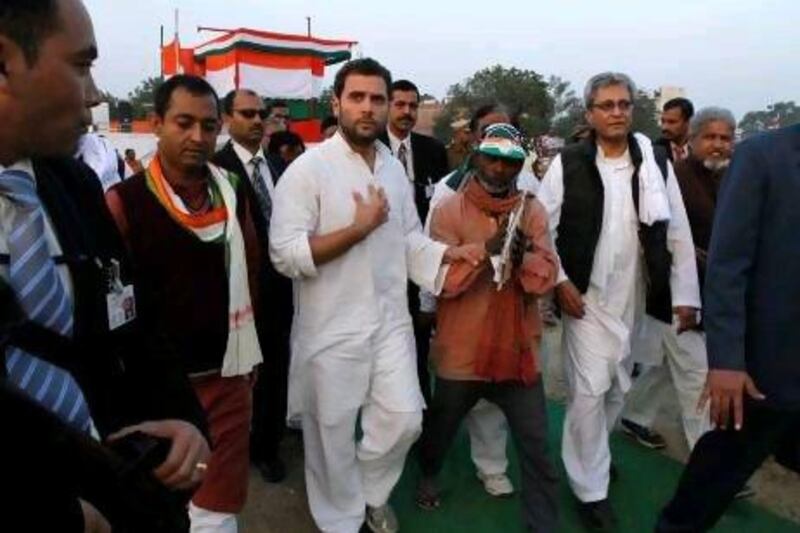NEW DELHI // A remark by a high-ranking member of the ruling Congress party questioning the role of Rahul Gandhi has roused fresh speculation from observers about a new position for the scion of the Nehru-Gandhi dynasty.
Last week, Salman Khurshid, the law minister, was quoted in the Indian Express newspaper as saying that his party lacked "ideological direction" from Mr Gandhi.
"The fact is that he is undoubtedly and unquestionably the number two leader in the party," Mr Khurshid said in the report. "Yet he has not taken up the mantle or accepted a functional responsibility. He is so far not willing to accept the number two position. In such a situation, we have to wait."
Mr Khurshid has since back tracked from his remarks, saying they had been misinterpreted and that he had only been urging Mr Gandhi to lead from the front "in a positive context".
The main opposition Bharatiya Janata Party (BJP) was quick to capitalise on Mr Khurshid's remarks.
Ravi Shankar Prasad, a BJP leader, said: "If [Mr Khurshid] says that the Congress is directionless then the country is in a state of drift", which was not good for the country.
"There is increasingly a feeling that if a transition is going to be thrust upon the party and the electorate, it may as well happen sooner rather than later," said Jatin Gandhi, who co-authored the biography Rahul, and who is not related to his subject.
Rahul Gandhi, the son of the party president, Sonia Gandhi, has been widely regarded as Congress's heir apparent, and as the next leader of a party that has traditionally drawn its presidents from the Nehru-Gandhi family. His father, Rajiv Gandhi, his grandmother, Indira Gandhi, and his great-grandfather, Jawaharlal Nehru, have all led the party and were prime ministers.
Mr Gandhi, 42, is Congress's general secretary and a member of parliament from a longtime Gandhi family constituency in Uttar Pradesh. Since 2009, he has been expected to pursue a larger role, either through a ministerial position or within the party.
These expectations were heightened last August, when Sonia Gandhi left for the United States to be treated for an illness.
But thus far, as Mr Khurshid said, Rahul Gandhi has only provided "cameos" of political activity.
Jatin Gandhi told The National that Rahul Gandhi's reluctance to take on a bigger role could be because he wants to launch the next stage of his political career when the party is riding a wave of popularity - as his father did.
"If you remember, after Indira Gandhi was killed in 1984, Rajiv Gandhi got a huge advantage as the result of a sympathy wave," Jatin Gandhi said.
The Congress-led government had been so tarnished with corruption scandals and charges of inefficiency that "it makes little sense to associate with it now", Jatin Gandhi said. "From his view, it is better to let [prime minister] Manmohan Singh take all the blame for this government and start afresh, rather than spoiling his image by becoming a minister."
Rahul Gandhi has organised the Congress youth wing and led the drive to improve the party's electoral performances in Uttar Pradesh, India's largest state and a stronghold of the regional Samajwadi and Bahujan Samaj parties.
In this latter objective, he has had mixed results.
During the last general elections in 2009, Congress won 21 out of 80 constituencies, an improvement upon the nine seats it won in the general elections in 2004. But this year, during Uttar Pradesh state elections, Congress added only six constituencies to its 2007 tally of 32 seats, a failure considering polls had projected the party would win nearly 80 seats.
"In Uttar Pradesh, people have not really understood the full script," Sandeep Chandra, a Congress party member, said on Saturday. "What is of consequence is that Rahul Gandhi took the bull by the horns, in what was essentially enemy territory."
Within the party, Mr Chandra said, Sonia Gandhi has already started to shift several responsibilities on to her son's shoulders. Instead of taking up a post as minister, Mr Chandra added, Mr Gandhi should be appointed as the party's working president. This post oversees the day-to-day affairs while Mrs Gandhi would keep her role as president and focus on the party's long-term strategy.
"With anybody else, a working president would be an alternate power centre. But with Rahul and Sonia, they are two sides of the same coin," Mr Chandra added.
Although the title of "working president" is not a formal one, Jatin Gandhi said, "it is not unheard of" to use such a designation to ease contenders into larger roles, instead of leaving them waiting in the wings.
[ foreign.desk@thenational.ae ]





